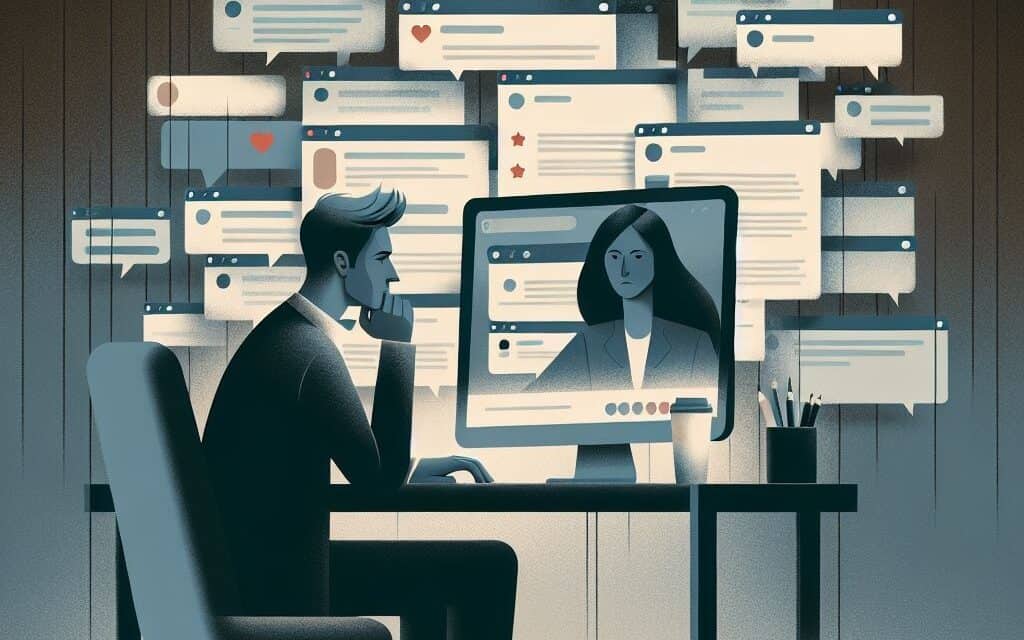For many of us, coping with online antisemitism and cyber hate is an all-too-familiar reality. Social media has become a central part of our daily lives, but it also opens the door to hate speech. While hate doesn’t always cause immediate harm, it can increase the risk of emotional damage both personally and socially. If you’ve managed to avoid the recent trend of “blaming the Jews”, imagine this: you’re in a room where people are shouting insults at you. The loudest, hateful voices dominate, making you feel unsafe. Social media is that room, and the hateful comments stay with you, waiting to hurt you again. It’s like being stuck in a toxic online environment, where no matter how hard you try to ignore it, the insults keep coming.
Since October 2023, Jews and supporters of Israel have increasingly become targets online. Antisemitic comments, memes, and messages flood our social media feeds across platforms like X, TikTok, Facebook, and Instagram. These aren’t just words—they’re direct assaults on our identity, culture, and faith. And the emotional toll is real.
Coping with Online Antisemitism Together
We don’t have to face this alone. Social media may have contributed to the rise of antisemitism, but we also have the tools to protect ourselves and fight back. It’s all about using those tools effectively. Below are some ways to help cope with online antisemitism and hate.
Follow These Tips on How to Cope with Online Antisemitism:
Acknowledge the Emotional Impact
The pain of online hate is real. Let’s stop pretending that just because it happens virtually, it shouldn’t affect us. Those words cut as deeply as if spoken face-to-face. When you’re attacked for your religion, ethnicity, or culture, it stays with you.
Feeling anger, frustration, or sadness when facing online antisemitism is completely valid. Ignoring these feelings only makes things worse. The emotional toll of hate speech can lead to anxiety, isolation, and even depression. Acknowledging and addressing these emotions is the first step toward protecting your well-being.
Avoid Responding to Every Troll
It’s tempting to respond to every hateful comment, especially when it feels personal, but keep in mind that trolls may not even be real. A Cyabra study in October 2023 found that 25% of accounts discussing Hamas’s attacks were fake.
Given that, setting boundaries online is crucial for your mental health. You don’t need to engage with every troll to stand up against hate, and instead focus your energy on meaningful conversations.
Mute, block, unfollow, and take breaks when necessary. Prioritizing your well-being doesn’t mean you’re walking away from the fight; it means you’re building the strength to keep going. Engaging with hate can leave you emotionally exhausted, so it’s important to take care of yourself first.
Use the Tools at Your Disposal
Another tip for coping with online antisemitism is to use tools to fight back. When faced with a flood of hate, it’s easy to feel powerless. However most platforms offer tools report antisemitic posts. While reporting antisemitic posts might not seem like much, it helps platforms take action and prevent others from facing the same hatred.
Most social media platforms also allow you to filter out certain words or phrases. Use these filters to create a safer online space. Don’t wait until a hateful post ruins your day—be proactive in protecting your mental health. If you’d like more guidance on how to effectively report content, Fighting Online Antisemitism (FOA) offers free workshops and training sessions on reporting antisemitic content.
Build a Supportive Community
To cope with online hate, it helps to surround yourself with people who understand what you’re going through. Joining or creating supportive online communities allows you to share your experiences and strategies for dealing with hate.
You can find communities like Fighting Online Antisemitism (FOA) that stand against antisemitism. And if you can’t find one that feels right, start your own. Having a network of people who understand the challenges of being Jewish online can make all the difference.
Unplug to Recharge
Social media can be addictive, but when it’s full of hate and negativity, it also becomes draining. That’s why it’s so important to take regular breaks. Whether it’s for a few hours a day or a full weekend, stepping away from social media helps you regain control of your emotions.
Instead, use that time to focus on activities you enjoy. Take a walk, read a book, or spend time with loved ones. Creating your own safe space offline is just as important as protecting yourself online.
Channel Your Frustration into Action
One of the most empowering ways to cope with online hate is by turning your frustration into action. Get involved in social campaigns that combat online hate. By working with others, you can create real change and build your own emotional resilience.
Taking action, whether through campaigns like #StopAntisemitism and #ReportHate or by volunteering with FOA, makes a difference. FOA’s global volunteers monitor and report antisemitic posts. By taking just a few minutes each day to push back against hate. Doing something is a reminder that while online hate is harmful, you’re not powerless in the fight.
The Bottom Line: We Have the Tools to Cope and Fight Back
Coping with online antisemitism and encountering hate can take a heavy emotional toll, but you have the power to protect yourself. Lean on your community, use the tools available to you, and take care of your mental health. The fight against antisemitism is important, but so is your well-being.

